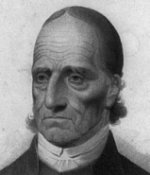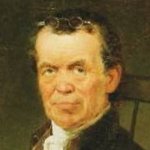Elias Hicks, who prompted the schism that split American Quakers into “Hicksite” and “Orthodox” branches, had a thing or two to say about war tax resistance.
An section from his journal dated reads:
This being the time of our quarterly meeting, I was mostly employed through the week in attention thereto. It was, I think, through the several sittings a solemn searching time. My mind was closely engaged on several subjects appertaining to our Christian testimonies; but more particularly that against war, which was now in the land. Friends, with others, were called upon for supplies by way of taxes to carry it on, which were levied various ways on the inhabitants. I felt my mind deeply engaged to lay before Friends the inconsistency of our actively complying with any such military requisitions, believing that if we did, we should not only become accessories in the war, but should have to bear a part of the guilt of shedding the blood of our fellow creatures. The Lord’s power was felt to preside, and the testimonies borne on the occasion were evidently clothed with divine authority, keeping down all opposition.
A section from reads:
[A]ttending our meeting for sufferings, at which information was received through one of its corresponding members, that the Legislature of our state, now sitting, were about forming a bill to lay a heavy tax on the members of our society, to be paid in lieu of personal military service; which, if passed into a law, would be likely to expose many of our members to severe suffering. The subject brought considerable exercise over the meeting, which led into a discussion of our testimony against war; in which it appeared manifest, that the deficiency of many of our members, in regard to a right support thereof, tended to obstruct, in a very considerable degree, our stepping forward, consistently with the nature of our appointment, to seek redress therein: nevertheless, after a considerable time spent thereon, and many different prospects opened, the meeting so far agreed, as to separate a committee of six Friends, to pay especial attention to the subject: who were directed to proceed therein, as the necessity of the case might require, and way should open for.
A section from reads:
In the meeting for worship which preceded our preparative meeting, I felt my mind renewedly engaged to call Friends’ attention to a faithful support of our Christian testimonies; particularly those against war and injustice; and that all might with firmness maintain our Christian liberties, without fear, favor, or affection, against every encroachment of the secular powers; as, in the present disturbed state of public affairs, laws had recently been enacted, levying taxes and other requisitions for the support of war; which was now spreading and making its destructive ravages in our once peaceful land. A solemn weight covered the meeting during the communication; and I was favored to relieve my mind for the present, from the weight of concern and exercise it lay under on those accounts.
A section from reads:
The rest of this week principally taken up in attending our quarterly meeting in New-York. It was in general rather an exercising time; for not only the answers to the queries from the several monthly meetings, manifested many deficiencies as to the right support of our Christian testimonies and discipline, but the diversity of sentiment among the active members respecting the full support of our testimony against war, also produced much exercise to the faithful; especially with regard to the active compliance in the payment of a tax, levied by the general government of the United States, for carrying on war, and other purposes of the government, which many Friends believed could not be actively complied with, consistently with our testimony on that head. For refusing the payment of this tax, a number of Friends had suffered in their property by distraint, to a considerable amount more than the tax demanded, some even three or four fold; whilst some others actively complied and paid the tax, and justified themselves in so doing, which caused considerable altercation in the meeting: nevertheless, I believe, Friends were generally preserved in a good degree of harmony with each other.
A section from reads:
In the meeting for discipline, I was led to call Friends’ attention to the fundamental principle of our profession; and to show the drift and design of those precious testimonies, as good fruit naturally emanated from a good tree; especially those two, the most noble and dignified, viz.: against war and slavery. And whether while we were actively paying taxes to civil government for the purpose of promoting war or warlike purposes in any degree, we were not balking our testimony in that respect; and pulling down with one hand, what we are pretending to build with the other. And in like manner with regard to slavery. For although we had freed our own hands from holding, by active force, any of this oppressed people, the Africans and their descendants, in unconditional slavery; yet, whether so long as we voluntarily and of choice, are engaged in a commerce in, and the free use of the fruits of their labor, wrested from them by the iron hand of oppression, through the medium of their cruel and unjust masters, we are not accessory thereto, and are partakers in the unrighteous traffic of dealing in our fellow creatures, and in a great measure lay waste our testimony against slavery and oppression. These subjects were largely opened, and the inconsistency of such conduct placed before the minds of Friends; accompanied with strong desires, that they might have their proper effect, in convincing them of the unrighteousness of such conduct.



